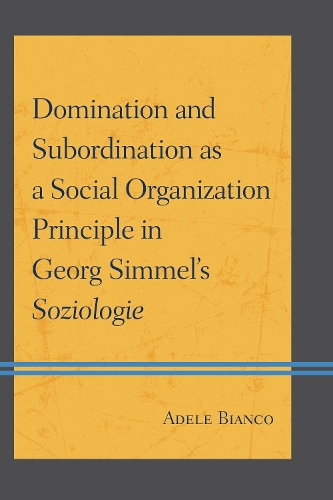
Domination and Subordination as a Social Organization Principle in Georg Simmel's Soziologie
(Hardback)
Publishing Details
Domination and Subordination as a Social Organization Principle in Georg Simmel's Soziologie
By (Author) Adele Bianco
Translated by Giuliana Fantini
Translated by Patrizia De Francesco
Bloomsbury Publishing PLC
Lexington Books
16th July 2014
United States
Classifications
Professional and Scholarly
Non Fiction
Development studies
303.33
Physical Properties
Hardback
160
Width 161mm, Height 237mm, Spine 17mm
372g
Description
Analyzing Georg Simmels theory of domination and subordination as presented in his Soziologie (1908), Adele Bianco focuses on concrete case studies to derive an interpretation of globalization processes. Within sociology, domination and subordination are reciprocal. They represent constitutive modes of associated living, based on a hierarchical structure. Domination and subordination reflect social configurations, but are very controversial categories. Sometimes perceived as a justification of the status quo, they also run the risk of legitimizing the perpetuation of inequalities. In truth, they are tools to help us understand social order and identify inequalities' regulating structures. Domination and Subordination as a Social Organization Principle in Georg Simmel's Soziologie begins by defining the relationship between domination and subordination at the micro levelthe relationship among subjects. Then, after discussing the macro level, Bianco employs a variety of case studies to expose the intricacies of Simmel's domination and subordination theory. The ensuing discussions of democracy, employment relationships, social relationships, and globalization answer such questions as: Why is society divided between a top and a bottom What does it mean to wield authority What degrees of power are held by those in a position of inferiority Why is the strong subject ultimately in need of the weak subject What can be said of a majority winning in a democracy, and what is the minority left with How can the social condition of the modern worker be reconciled with his proclaimed freedom (and) What does subordination to the employer effectively comprise Scholars and students of sociology, social theory, labor studies, and psychology will benefit from this book's combination of intricate theories and real-world case studies towards a comprehensive theory of modern globalization.
Reviews
Adele Bianco gives a reading of Simmel in which modern society exists as a self-regulating system maintaining itself through its own operation as a balanced and harmonious whole. Bianco emphasizes the dynamic aspect of the interactions between dominant and subordinate parties. This core of Simmel's sociology makes for sociation, or Vergesellschaftung, and tends to turn vertical social relations into horizontal ones. -- Kauko Pietil, University of Tampere
In this important study, Adele Bianco investigates one aspect of Simmel's thought to show its relevance to democratic theory, economic life, and the forces of globalization. The result is a timely and noteworthy application of ideas central to Simmel's sociology. -- Lawrence A. Scaff, Wayne State University
Adele Biancos book is a stunning contribution not only to scholarship on Simmel but also to sociology in general. Biancos review of Simmels approach is parsimonious, emphasizing what is important while, at the same time, doing complete justice to the complexity and nuances in Simmels formulation. The book is full of new ideas about how Simmels theorizing can be used in the analysis of a wide range of empirical phenomena. This is a stunning book, which lays out in very clear ways Simmels analysis of domination and subordination as a basic social form on which social reality is built. It certainly ranks as one of the best analyses that I have ever read on Simmel. It is a must read for almost all sociologists. -- Jonathan Turner, University of California, Riverside
Author Bio
Adele Bianco is associate professor of sociology at the University of Chieti-Pescara.
